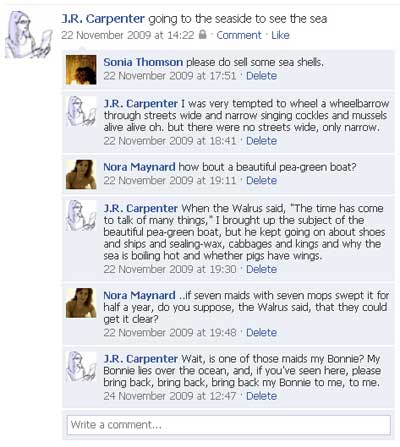I’m writing a new book. It’s writing itself, really. It’s called GENERATION(S). It expands upon Story Generation(s), a series of short fictions generated by Python scripts adapted (with permission) from 1k story generators written by Nick Montfort. GENERATION(S) also incorporates GORGE, a never-ending tract spewing verse approximations, poetic paroxysms on food, consumption, decadence and desire, a hack of Montfort’s elegant poetry generator Taroko Gorge.
In the print book, GENERATION(S), the texts the generators produce are intertwined with the generators’ source code, and these two types of texts are in turn interrupted by excerpts from the meta narrative that went into their creation. For example, most of the sentences in the fictions generated by I’ve Died and Gone to Devon started off as Tweets, which were then pulled into Facebook. Some led to comments that led to responses that led to new texts. The following exchange started as a Tweet, was pulled into Facebook, became this sentence in Devon.py: “On a clear day, from the top of the drive we can see south to the sea,” and led to this blog post: To See the Sea. All these stages of intermediation are represented in the print book iteration of GENERATION(S).

Generation(s) will be published by TRAUMAWEIN, Vienna-based publishers of international works of codework, interfiction, microprose, chatlog, gamelog, twitter / facebook feeds and other new narrative forms, every 3 months in book form and in much more frequently online.
“The thing about trauma is to make “screenshots/timestamps” of those never ending stories going on.” Luc Gross, TRAUMAWIEN
GENERATION(S) goes to the printers by the end of this month and will be launched in Vienna July 23, 2010.